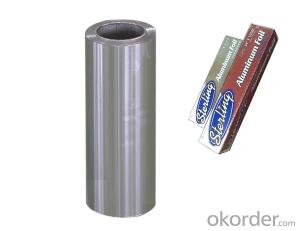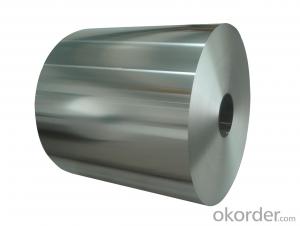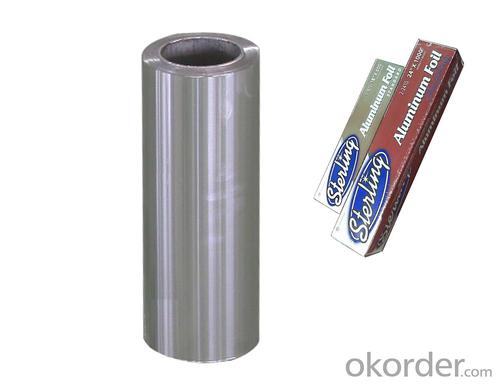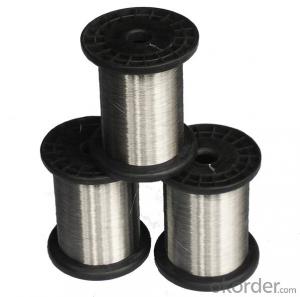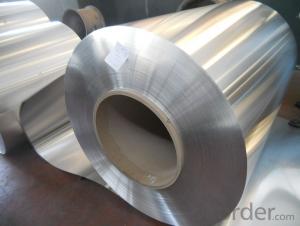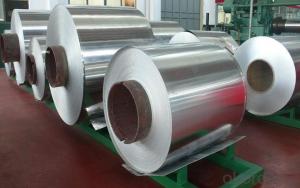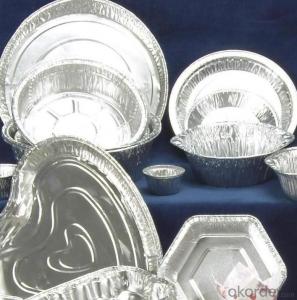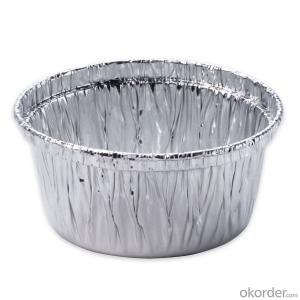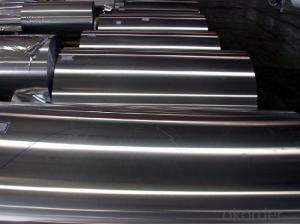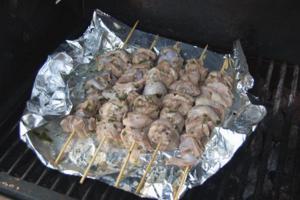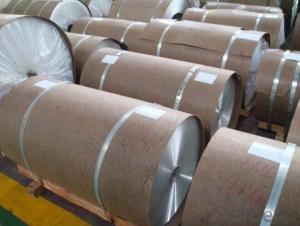Decorative Aluminum Sheets Canada - Household Aluminium Foil FDA Certificate
- Loading Port:
- Shanghai
- Payment Terms:
- TT or LC
- Min Order Qty:
- 1 m.t
- Supply Capability:
- 5000 m.t/month
OKorder Service Pledge
OKorder Financial Service
You Might Also Like
Aluminium Foil are used for Cooking, Storing, Freezing,and wrapping.
Household Aluminium Foil Roll specification:
Material: Aluminium Foil Alloy: 8011 "O"
Thickness: 9micron-24micron is available for different purpose.
Length: 5M--300M As per customer requirement for Houseuse or Foodservice,Catering Use.
Width:250mm--600mm, Regular width: 300mm/450mm as per customer requirement.
Packing: colour box / dispenser box/ Printed PP Sleeve,Bag / Shrink wrap with Printed paper/ Plastic Bubble bag as per customer requirement.
| Description | Household Aluminum Foil |
| Material | Aluminium alloy |
| Shape | Roll |
| Alloy | 8011-O 8006 |
| Length | 3m~300m |
| Usage | Food, ketchen packing storing freezing ,etc |
| Core ID | 28mm 32mm 35mm 38mm |
| Thickness | 9mic-22mic |
| Width | 200mm-600mm |
| Package | Colour box / dispenser box/ Printed PP Sleeve,Bag / Shrink wrap with Printed paper/ Plastic Bubble bag as per customer requirement. |
| delivery time | 25days-28days |
| payment | T/T,L/C |
| quality tolerance | ±3% |
| cerfificate | ISO9001:2000,FDA,SUV,NQA,SGS |
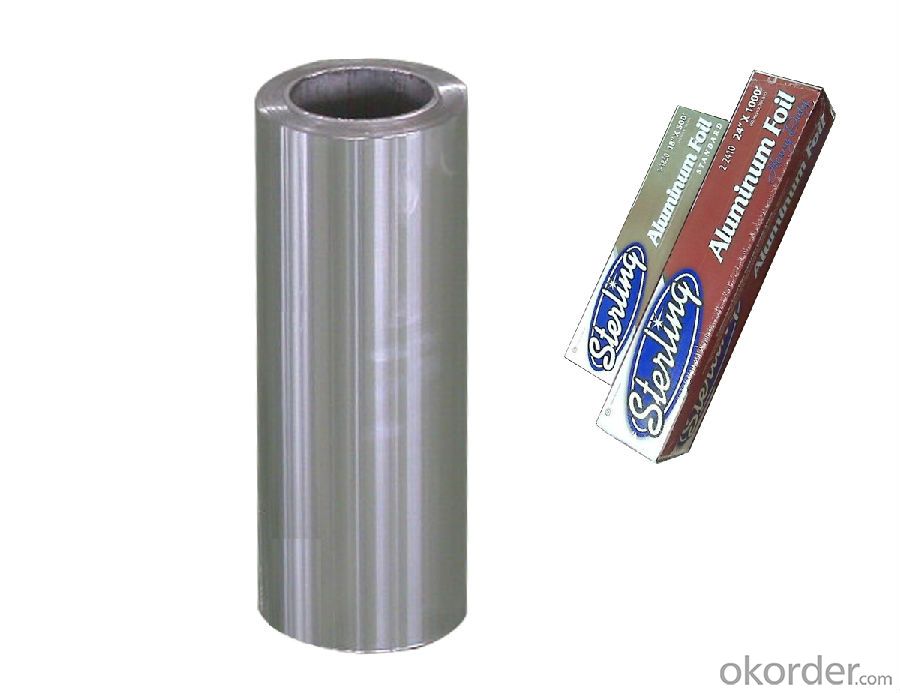
- Q: Can aluminum sheets be used for solar reflectors?
- Indeed, solar reflectors can utilize aluminum sheets. With its high reflectivity and exceptional resistance to heat, aluminum emerges as an optimal material for such purposes. The reflectiveness of aluminum sheets aids in redirecting and intensifying sunlight onto solar panels or other solar equipment, thereby maximizing their energy efficiency. Moreover, the lightweight and durable nature of aluminum renders it effortlessly manageable and fitting for outdoor applications.
- Q: Can aluminum sheets be bent or formed without cracking or breaking?
- Yes, aluminum sheets can be bent or formed without cracking or breaking, but it depends on the thickness of the sheet and the method used for bending or forming. Aluminum is a highly malleable metal, which means it can be easily bent or formed into various shapes without breaking. However, if the sheet is too thin or the bending or forming process is done without proper care or precision, there is a risk of cracking or breaking. To avoid this, it is important to use appropriate tools and techniques, such as using a bending brake or a rolling machine, and ensuring that the sheet is not subjected to excessive force or stress during the process. Additionally, annealing the aluminum sheet before bending or forming can increase its flexibility and reduce the chance of cracking. Overall, with the right approach and precautions, aluminum sheets can be successfully bent or formed without cracking or breaking.
- Q: How thick can aluminum sheets be?
- Aluminum sheets can vary in thickness depending on the specific application and requirements. Generally, aluminum sheets are available in thicknesses ranging from 0.008 inches (0.2 mm) to 0.25 inches (6.35 mm) or even thicker for specialized industrial applications. However, it's important to note that aluminum sheets thicker than 0.25 inches are less common and may require custom manufacturing or special orders. Ultimately, the thickness of an aluminum sheet is determined by the intended use, structural requirements, and the overall feasibility of the manufacturing process.
- Q: What are the necessary safety measures to be aware of when handling aluminum sheets?
- <p>When working with aluminum sheets, it's crucial to wear appropriate personal protective equipment (PPE), including gloves to prevent cuts and eye protection to shield against flying debris. Ensure good ventilation to avoid inhaling dust or fumes from cutting or polishing. Use sharp tools to minimize the risk of accidents and always cut away from your body. Keep the work area clean and free of clutter to prevent slips or trips. Be cautious of electrical hazards if using power tools, and ensure all tools are properly grounded. Finally, be aware of the fire hazard potential of aluminum dust and store it safely away from ignition sources.</p>
- Q: what is better for my 96 mustang gt. porting and polishing my stock heads or getting aluminum heads. also could i do a 3v conversion?
- Your car already has aluminum heads on it. I'm not sure if the 3v heads bolt on and if they did they would expensive. Porting and polishing is not easy and often very expensive. A lot of people do more harm than good. This is not a Gran Turismo game where you click a button. If I were you this is what I would do. 96-98 4.6 heads suck, bottom line. Your car put out 215 HP stock. In 99 Ford starting using what is called the PI head. The horsepower went up to 260 mainly because of the better heads. Search on OKordermotors or look at Ford Racing Parts, they sell the heads brand new for $375 a piece I think plus the intake for around $200. They will do much better than porting your heads and probably cost less too. If you really want to get them ported or get ported heads look into Patriot Peformance, they sell 4.6 heads already ported. Good luck.
- Q: Can aluminum sheets be used for electronic enclosures?
- Yes, aluminum sheets can be used for electronic enclosures. Aluminum is a lightweight and durable material that offers excellent heat dissipation properties, making it suitable for protecting electronic components. Additionally, aluminum sheets can be easily fabricated to create custom enclosures that provide electromagnetic shielding and protection against environmental factors.
- Q: Can aluminum sheets be used for solar panel applications?
- Yes, aluminum sheets can be used for solar panel applications. Aluminum is a popular choice for solar panel frames and mounting systems due to its lightweight, strength, and corrosion resistance properties. It is also easily recyclable, making it an environmentally friendly option. Aluminum sheets provide structural support and stability to solar panels, ensuring they can withstand various weather conditions and last for a long time. Additionally, aluminum's high thermal conductivity helps dissipate heat generated by the solar panels, improving their overall performance and efficiency.
- Q: Can aluminum sheets be anodized for improved hardness?
- Yes, aluminum sheets can be anodized to significantly improve their hardness. Anodizing is an electrochemical process that thickens the natural oxide layer on the surface of the aluminum, creating a durable and corrosion-resistant coating. This process enhances the hardness and durability of the aluminum sheets, making them more resistant to wear, scratches, and other forms of damage.
- Q: I think I remember that this is true of aluminum foil. When it's charged, it'll push away from itself, I know. Why do magnets have seemingly no effect?
- Aluminum is a non-ferrous metal. Ferrous metals contain Iron which is magnetic. When aluminum has a charge applied to it, it acts like any conductor would, the charge has magnetic properties. the aluminum is still not magnetic, but it acts like a magnet due to the charge.
- Q: iron-based alloys over aluminum in structural members of bridges and buildings?
- Because it's lighter with about the same strength as iron alloys
Send your message to us
Decorative Aluminum Sheets Canada - Household Aluminium Foil FDA Certificate
- Loading Port:
- Shanghai
- Payment Terms:
- TT or LC
- Min Order Qty:
- 1 m.t
- Supply Capability:
- 5000 m.t/month
OKorder Service Pledge
OKorder Financial Service
Similar products
Hot products
Hot Searches
Related keywords
